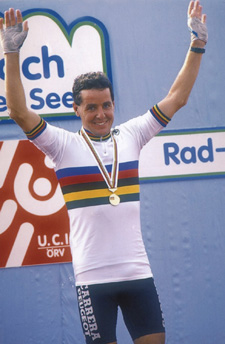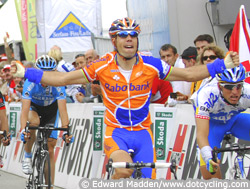 Former Tour de France champion Stephen Roche has commented on Saturday’s Milan-Sanremo Classic, applauding Oscar Freire for his victory while also stating that other riders threw away their chance to win.
Former Tour de France champion Stephen Roche has commented on Saturday’s Milan-Sanremo Classic, applauding Oscar Freire for his victory while also stating that other riders threw away their chance to win.
Describing Freire’s dramatic sprint success ahead of Tom Boonen (Quick Step), Alessandro Petacchi (Lampre-Farnese Vini) and 22 others as “a great victory,” he bemoaned the lack of attacks by the non-gallopers on the climbs heading towards the finish.
“The result was good in that there was a great winner, Freire,” he told VeloNation in the first of his analyses of the 2010 racing season. “He is going a long time. He has had a lot of back trouble which has hampered his career. But he is a triple world champion, he has won three Milan-Sanremos. He is a very, very classy rider, and very quiet, discrete, very modest. That’s why people like to see him win.
“Also, he more or less retired last year, and basically only came back when he heard that the world championship course would suit him. That goes to show you the class of the man, to be able to get back on top.”
 However Roche was less complimentary about the other riders in the race who, he feels, threw away their chances. “The race was good, but also disappointing at the same time,” he explained. “If you saw the way the riders rode up the Poggio and the Cipressa, it was a waste. Nobody attacked when Garzelli was on the front, they left it too close to the top.
However Roche was less complimentary about the other riders in the race who, he feels, threw away their chances. “The race was good, but also disappointing at the same time,” he explained. “If you saw the way the riders rode up the Poggio and the Cipressa, it was a waste. Nobody attacked when Garzelli was on the front, they left it too close to the top.
“Basically, I think someone should have attacked earlier. You have all the climbs along the seafront, but they didn’t serve any purpose other than whittling things down on the back of the group. It was a bit disappointing.”
The big guns held back during the race, with no major moves being launched by them on the Cipressa. The Poggio was also relatively quiet; Stefano Garzelli set a blistering pace up the climb, and nobody moved until it was too close to the summit to open a sufficient gap.
“A lot of guys were sitting on the wheels there, even though they had no chance of winning if it came down to a bunch sprint. Yet nobody even tried getting out of the saddle,” he said, pointing to a lack of aggression. “They were content to ride one long line, which is very disappointing. I always said that while they keep going like that, the sprinters will be really happy.
“If you saw Garzelli, he was on the front and everyone would think he was riding a stormer. He was indeed riding a stormer, but he was waiting for someone to attack so he could take a rest. When the first guy did attack, he just pulled over and went straight from the front out the back door. If someone had attacked earlier, that would have upset the whole train and set another race in motion.”
Roche rode Milan-Sanremo on several occasions and while it was a Classic that didn’t suit him as much as the hillier Ardennes races, he did take a big success in the area. During the 1987 Giro d’Italia he won a time trial down the Poggio. Even knowing how to ride the descent rapidly, he nevertheless recognises that a reasonable lead is needed by riders going over the summit if they are to hold off the sprinters and their teams behind. Accelerating clear near the top doesn’t give enough time to make a difference.
“I think it was very unfortunate that nobody tried attacking the train. Especially on the Poggio; that is brilliant for attacking on,” he said. “You might say that the Cipressa is too far out, but the start of the Poggio is less than ten kilometres from the finish. It is disappointing seeing a 280-odd kilometre race coming down to the Poggio and it being a long lineout there, where nobody is really attacking.”
One of those he agreed waited far too long was the Katusha leader Filippo Pozzato. The Italian jumped before the summit of the Poggio, but it was far too close to the top to make a difference. “He always looks very, very strong, but did he go just to say he tried?” Roche asked, making the point that it was too little, too late. “He had a go, but was he really, really committed?”
| During his career Stephen Roche added many of the sport's biggest races to his palmares, and will be sharing his candid insight with VeloNation readers throughout the 2010 season. Stephen now runs the Roche Marina Hotel in Villeneuve-Loubet, near Nice, France. He hosts teams and individuals who use the hotel as a training base, giving them access to famed local climbs such as the Col d'Eze and Col de Vence, as well as a location that enjoys 320 days per year of sunshine. |
 |